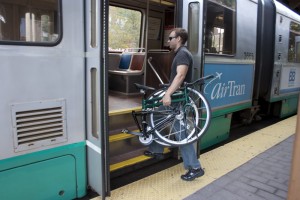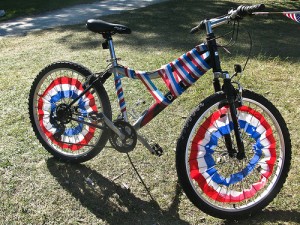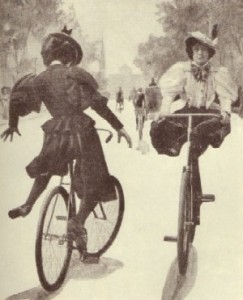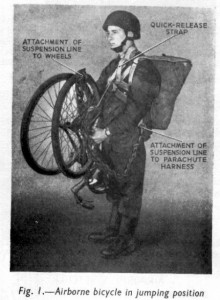In anticipation of Canada Day (July 1), American Independence Day (July 4), and Bastille Day (July 14), it seems appropriate to take some time to reflect on the connection between bicycles and independence. One great thing about the bicycle is that it is essentially egalitarian; people of different ages, from different classes, genders, and cultures all ride bicycles. Old or young, rich or poor, everyone can enjoy the independence and feeling of freedom that comes with riding a bicycle.
The Emancipation of Women
By the late 19th century, the First Wave of the Women’s Movement (focused largely on gaining political power and the right to vote) was already well under way. But the introduction of the bicycle around this time increased its momentum: the bicycle demanded that women wear more practical clothing, issuing in a “rational dress” style, which saw the elimination of corsets and overly long skirts (restrictive to women’s movements) and the introduction of bloomers (truly scandalous for the time!). The bicycle helped establish women’s independence by allowing them to venture further afield by themselves, and mingle with men without being supervised by chaperones. In addition to these very practical changes, many women saw riding a bicycle as a metaphor for self-control and self-determination. For these reasons, Susan B. Anthony said that the bicycle has “done more to emancipate women than anything else in the world”.
The Folding Bike during WWII
The bicycle, in particular the folding bicycle was also instrumental in the British war effort during WWII. While Montague folding bikes would not be developed for another 45 years or so, the British used a BSA Airborne bicycle. The BSA bikes folded by means of a hinge in the frame that could be fixed open by tightening a wing nut. And like the Montague Paratrooper, these bikes were designed to allow British paratroopers to jump from planes with the bicycle; the BSA folding bike could strap right to the paratrooper’s chest. While wartime transportation ultimately centred around the Jeep more than the bicycle, the folding bike was nonetheless important: it was used at the D-Day invasion in June of 1944 and the Battle of Arnhem in September later that same year.
The Bicycle and Freedom Today
 With such a history of promoting independence and establishing freedom, it comes as no surprise that bicycles continue to function in this capacity. For example, in the U.S., a major political concern is dependence on foreign oil. The more people ride bicycles, the less gasoline is consumed, the less the U.S. needs to rely on sources of foreign oil. So in a way, the bicycle can help the U.S. government re-establish political and economic independence.
With such a history of promoting independence and establishing freedom, it comes as no surprise that bicycles continue to function in this capacity. For example, in the U.S., a major political concern is dependence on foreign oil. The more people ride bicycles, the less gasoline is consumed, the less the U.S. needs to rely on sources of foreign oil. So in a way, the bicycle can help the U.S. government re-establish political and economic independence.
 The bicycle is also very important in developing countries. Bicycle transportation is reliable and comparatively cheap. Studies have shown that by providing a poor family with a bicycle, they are able to increase their income by up to 35%. As such, the bicycle is showing itself to be a vital tool in helping people achieve economic and social mobility.
The bicycle is also very important in developing countries. Bicycle transportation is reliable and comparatively cheap. Studies have shown that by providing a poor family with a bicycle, they are able to increase their income by up to 35%. As such, the bicycle is showing itself to be a vital tool in helping people achieve economic and social mobility.
There is also an undeniable feeling of freedom you have when you ride a bicycle. This goes all the way back to the early days of the bike – in the late 19th century, the first time Orville Wright (of aviation’s Wright brothers) rode a bicycle, he shouted to his brother Wilbur, “I feel like I’m flying!”. And although the automobile is often touted as the epitome of freedom of movement, when you compare driving in a car to riding a bike, you find that, in a sense, you are freer on a bike:
In a car you’re always in a compartment, and because you’re used to it you don’t realize that through that car window everything you see is just more TV. You’re a passive observer and it is all moving by you boringly in a frame.
On a cycle the frame is gone. You’re completely in contact with it all. You’re in the scene, not just watching it anymore, and the sense of presence is overwhelming.
(Zen and the Art of Motorcycle Maintenance, Robert Pirsig).
While this was written about motorcycles, it applies equally to bicycles, perhaps even more so, since you move by your own power.
Even More Freedom with a Folding Bike
 The folding bike takes the freedom of a traditional bicycle and takes it to the next level. On a folding bike, you can go everywhere you can on a traditional bicycle (this is especially true of Montague folding bikes, which have full size wheels and industry standard components), without being limited by size, space or mobility issues that sometimes restrict where you can go and what you can do with a traditional bicycle (e.g. the subway/indoor storage/on a plane). You have all the independence that comes with riding a bicycle, plus the additional freedom to choose your mode of transportation at any given moment.
The folding bike takes the freedom of a traditional bicycle and takes it to the next level. On a folding bike, you can go everywhere you can on a traditional bicycle (this is especially true of Montague folding bikes, which have full size wheels and industry standard components), without being limited by size, space or mobility issues that sometimes restrict where you can go and what you can do with a traditional bicycle (e.g. the subway/indoor storage/on a plane). You have all the independence that comes with riding a bicycle, plus the additional freedom to choose your mode of transportation at any given moment.
What Better Way to Celebrate your Nation’s Independence than Riding a Bike?
If you’re celebrating a national holiday or even taking a vacation in the upcoming days or weeks, do you have any special plans that involve your bicycle? What do you enjoy most about riding? Do you think riding a bicycle gives you more freedom than other forms of transportation? Do you appreciate your freedom more when you’re on a bike?






I will be taking a two day ride with my Montague/Swissbike Tx over the holiday weekend. It will include using the folding option due to restrictions on the local trains. My ride will start in Joliet, Il. and follow the I&M Canal trail and end in Kewanee, Il on the Hennepin Canal Trail. Yes, I think that riding a bike allows more freedom to enjoy the environment and your surroundings. It also keeps the gas in my automobile for a while longer also!
That sounds like an awesome ride – and isn’t it nice to be able to take your bike on the train? If you took any photos (especially photos featuring your bike) we’d love to see them!